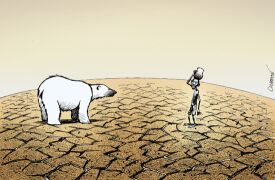
Climate change is upon us. We all know it.
Every summer is hotter, every monsoon weirder, every winter more elusive. It has been a long time since dawn of first day of Diwali was cold.
We are told pole caps are melting. Seas are rising. Some day, polar bear is likely to stray into a parched field of a third world country of Asia or Africa. Who will be more surprised? Labourer or bear?
Let us not look surprised. With our ultra-individualized existence. Big and bigger cars and houses. Air conditioners and more conspicuous consumption. We know it.
No comments:
Post a Comment